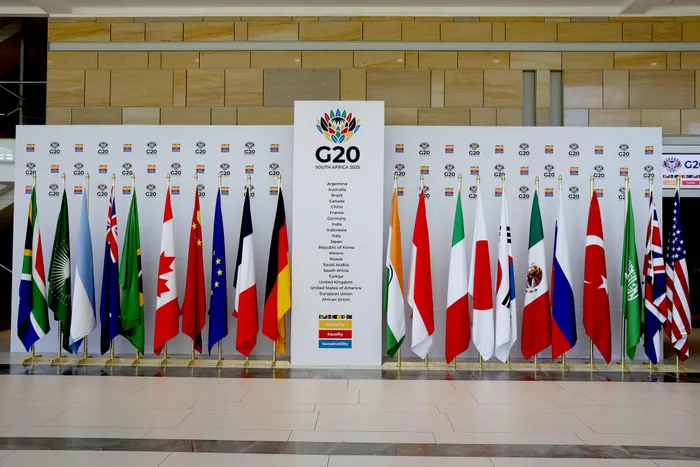Essential information for foreign missions ahead of the G20 Leaders' Summit

Johannesburg prepares to host the G20 Leaders' Summit at Nasrec, south of the city, and the Department of International Relations has informed foreign missions that access to some of its services will be severely curtailed.
Image: Supplied
Foreign missions could have limited access to diplomatic immunities and privileges (DIAP) – such as alcohol and tobacco products – for up to two weeks from Monday, November 10, due to the upcoming G20 Leaders’ Summit.
The Department of International Relations and Cooperation (DIRCO) has informed foreign missions that with the upcoming G20 Leaders' Summit 2025, services rendered by DIAP will be impacted.
“It should be noted that between November 10 and 25, 2025, officials will be deployed for the G20 Leaders' Summit, which will affect services such as diplomatic accreditation, temporary residence visas, and vehicle registrations, rendered by DIAP,” reads a DIAP circular sent to diplomatic missions and international organisations by DIRCO last month.
DIAP also manages diplomatic privileges with regard to alcohol and tobacco products imported or purchased at a licensed special shop for diplomats.
Dirco determines quotas of alcohol, such as spirits, wine, and beer, and tobacco products (cigarettes, rolling tobacco, and cigars), and can approve greater quantities than the standard quantities and/or quotas if properly motivated.
The department advised foreign missions to submit service requests well before November 10 to ensure timeous processing.
DIRCO further warned that processing of requests between November 10 and 25 will be limited to emergencies only and that during this period, its main reception will only accept urgent applications and correspondence for just an hour between 10am and 11am daily.
The department has budgeted almost R500 million for the summit, which will be hosted by Africa for the first time, at the Nasrec Expo Centre in Johannesburg on the weekend of Saturday, November 22, and Sunday, November 23.
Just over R194m has been budgeted for the leaders’ summit, with almost R104m set aside for venues, facilities, interpreters, and catering, R32.6m for accommodation, R44.4m for ground and domestic air transport, R14m for DIRCO’s support staff and compensation, as well as about R4.3m for support services from the stakeholders department.
In total, DIRCO budgeted an estimated R497m for hosting the summit and G20 Sherpa track meetings towards the summit between December last year and the end of this month. Sherpas are described as leaders of each country, who take the discussions and reach agreements at the final summit with heads of state and government.
Earlier this year, the National Treasury issued a stern warning that, due to the government being in a tight fiscal environment, institutions involved in G20 should focus on high-impact initiatives to reduce costs and that departments were expected to fund activities primarily through reprioritisation and realignment of existing budget baselines.
It indicated that the government, as the host country, would incur the reasonable costs associated with foreign ministers and heads of state, in accordance with the host country agreement and G20 protocols, including accommodation, executive vehicles, drivers, and other travel-related expenses.
Treasury also urged that meeting venues should be cost-effective, convenient, and accessible, considering factors such as size, capacity, amenities, transportation, and technical aspects.
Foreign governments, international organisations, and institutions are responsible for their own delegates and participants, including accommodation and air travel for the G20 conferences, meetings, working groups, engagements, and events.
During this week’s declaration of readiness by Gauteng Premier Panyaza Lesufi, it emerged that 20 hotels were recommended by DIRCO in Johannesburg and Tshwane, but some of the countries attending have identified others on the West Rand.
Law enforcement agencies responsible for policing the G20 Summit will deploy and secure delegates, and as attending countries continue to confirm accommodation particulars with their chosen hotel.
It was also announced that the routes from all ports of entry to hotels and the Nasrec Expo Centre, and back to hotels, are secured.
Lesufi stated that delegates will be escorted by a unified force comprising the SA Police Service, National Traffic Police, Gauteng provincial traffic, and the Tshwane, Johannesburg, and Ekurhuleni metropolitan police departments.
He indicated that a coordinated and comprehensive strategy was in place to ensure that the province's four main ports of entry – O.R. Tambo International Airport, Fireblade Airport, Lanseria International Airport, and the Waterkloof Air Force Base – were all operating at an elevated state of readiness.
loyiso.sidimba@inl.co.za